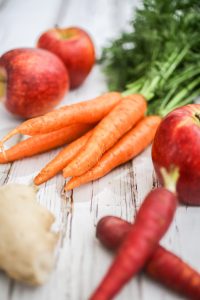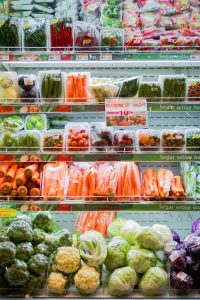
Heather Kolich, ANR Agent, UGA Extension Forsyth County
Fruits and vegetables make quick, tasty, and nutritious snacks and meals. They contain many of the vitamins and minerals our bodies need to stay healthy and fight illnesses. Plus, there are plenty of economical choices. What fresh fruits and vegetables lack are added preservatives. Like other perishable foods, they good bad – often sooner rather than later. Fortunately, with careful selection and proper storage, some fresh produce can hold goodness for weeks or months.
Selection
Some produce continues ripening after it’s harvested. If you don’t need an item ripe and ready to use immediately, you can purchase under ripe fruits. Bananas, tomatoes, peaches, cantaloupe, and avocados can be purchased when they are still firm and green. They will ripen and turn the appropriate color over the next few days if placed on a countertop out of the sun.
Storage
Managing temperature and humidity is important for storing produce. Storing food at the right temperature helps it last longer and stay safe to eat. Keep the refrigerator at 40 degrees Fahrenheit (4 degrees Celsius) and the freezer at -18 Degrees Fahrenheit (0 degrees Celsius) or lower. Hang an appliance thermometer inside and check the temperature periodically.

Leafy greens are very sensitive to humidity. If your lettuce wilts quickly, place a damp paper towel into the storage container to add some moisture. On the other hand, if your lettuce tends to collect water and spoil quickly, place a dry paper towel into the container to soak up extra water. Replace the paper towel as needed.

Other produce has great staying power. When properly stored, apples, oranges, carrots, onions, and sweet potatoes can last for months.
Stored in the refrigerator and separated from other foods, apples will maintain freshness for 2-4 months. Whole carrots with just a bit of green stems remaining can last in the refrigerator for up to six months. Baby carrots don’t last as long. Refrigerate oranges to keep them for up to three months.
Onions and sweet potatoes need to be air dried, or cured, for several days after harvest, and then kept cool and dry, but not refrigerated. Keep onions in a mesh bag or open box for longer storage. Sweet onions will keep for 30-60 days, and cooking onions can last up to 90 days. Sweet potatoes can be stored for up to six months.
With long storage, it’s a good practice to inspect produce frequently for signs of decay. Remove compromised produce immediately to keep spoilage from spreading.
Of course, the freshest produce is the kind you can pick right from your own garden. If home gardening is a 2023 goal, come grow with Forsyth County Extension’s Food Gardening Large and Small workshop series.
Spring Gardening and Seed Starting
Feb. 15, 10 a.m.-noon
Learn how to plan your garden and grow your own transplants from seed. Participants will plant a seed flat to take home. $25, preregistration required.
Growing Food in Small Spaces
Feb. 22, 10 a.m.-noon
Learn about container, square-foot, and strawbale gardening. Participants will plant a container garden to take home. $25, preregistration required.
Small Orchard Start-up and Management March 1, 10 a.m.-noon
Learn how to incorporate perennial fruit plants in your home food production. Workshop covers plant selection, proper planting, care and pest management, and pruning tools and techniques. $5, preregistration required.
Registration begins January 3, 2023. Visit https://extension.uga.edu/county-offices/forsyth.html for registration information.